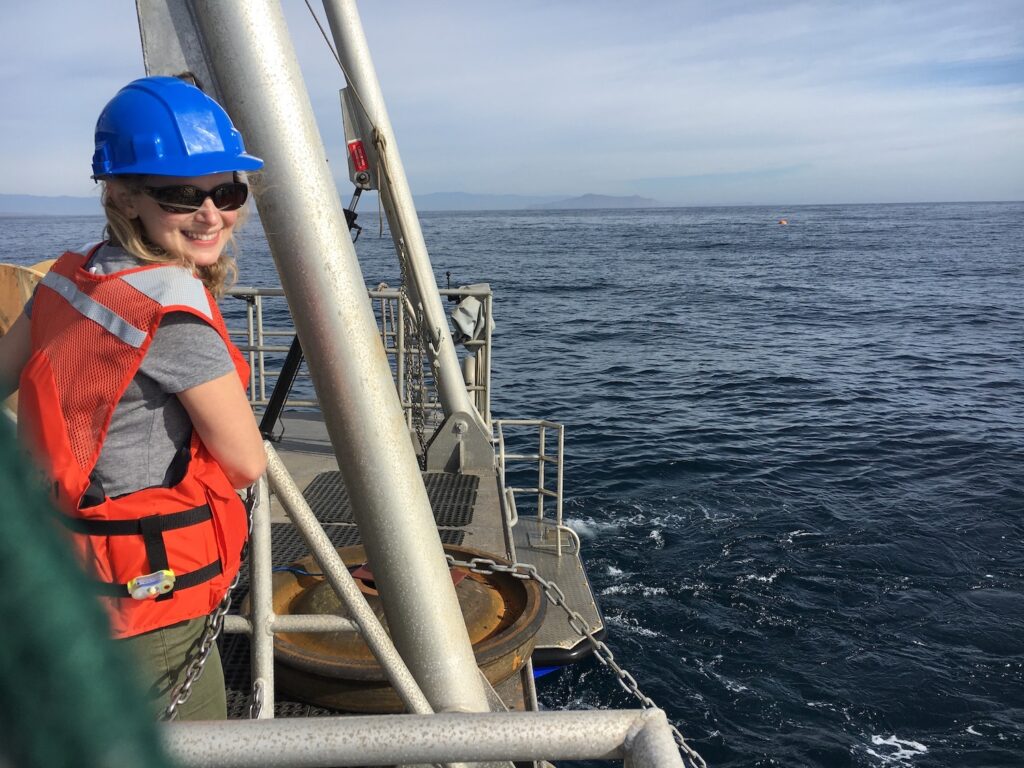“I always loved science class and science questions, and I went to science camps – but as a kid I didn’t really put it together that being a scientist was a career or something other than sitting at a microscope in a lab coat,” Our guest this week, Dr. Samara Haver, has come a long way from not realizing the myriad of careers in science when she was a child. She now works as a marine acoustician, researching underwater soundscapes and ocean noise to understand the repercussions for marine ecosystems and animals, such as humpback and blue whales.

Samara is a recent graduate from Oregon State University (OSU) having completed both her Masters and PhD in the Department of Fisheries, Wildlife, and Conservation Sciences (FWCS). She is continuing at OSU as a postdoctoral scholar in FWCS, where she is advised by Dr. Scott Heppell and works within the OSU/National Oceanic and Atmospheric Administration (NOAA) Cooperative Institute for Marine Ecosystem and Resources Studies. Her dissertation research focused on underwater recordings from 12 diverse and widespread marine habitats in U.S. waters. Data from each site was recorded by stationary hydrophone (underwater microphones), a calibrated array collectively named the NOAA/National Park Service Ocean Noise Reference Station Network (NRS). The NRS is an ongoing multi-agency collaborative effort to record underwater sound throughout the U.S. to understand about the differences and similarities of soundscapes in U.S. waters, and provide information to managers about protected species. The 12 locations are deployed along west and east coasts of the U.S., as well as in the northern and southern hemispheres, and includes locations within U.S. National Marine Sanctuaries and U.S. National Parks. One of the primary objectives of this highly collaborative and nation-wide comparison was to quantify comparable baselines of ocean noise in U.S. waters. When the NRS was first established, there weren’t any other U.S. research groups collecting passive acoustic data in these widespread locations using identical time-aligned recorders. Thus, the NRS provided new and comparable information to NOAA and the NPS about the levels and sources that contributed to underwater sound.

Hence, Samara’s PhD research revolved around analyzing the recordings from the 12 NRSs to explore several questions regarding differences in U.S. soundscapes, including baleen whale presence which she was able to identify by their unique vocalizations. Many marine animals, including baleen whales, evolved to rely on sound as their primary sensory modality to survive in the dark environment of the ocean. Unlike humans, who rely heavily on sight, whales must find food, communicate, navigate, and avoid predators using sound. However, the ocean has become a noisy place, primarily because of increased anthropogenic (human-caused) activity, such as shipping, marine construction, and seismic surveys, to name a few. To best understand how noise is affecting the life history of baleen whales and their habitats, we need to understand how loud the ocean is, how much noisier it’s getting, and what is generating the noise.

Samara has become an expert in characterizing and understanding ocean soundscapes, uncovering a lot about the differences and similarities in U.S. soundscapes. To hear about what exactly she learned during her PhD and what management implications her results have on protected species and habitats, tune in on Sunday, November 7th at 7 PM on KBVR 88.7 FM, live stream the show, or download Samara’s episode on Apple Podcasts!
Don’t want to wait until then? You can check out Samara’s publications on her GoogleScholar or follow her on Twitter!



